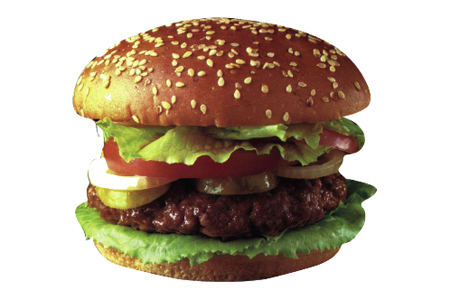
The Rise and Rise of Obesity
Issue 8 Nov / Dec 2004
First Published on November/December 2004
To access the issue page, click here
In July 2004, the death of a Leicester man, Iain Sturgess brought the problem of obesity back into the headlines. Only a few weeks prior to his death, Mr Sturgess had undergone surgery to reduce the size of his stomach, an operation for which he had waited more than two years. He weighed over forty stones and had undergone the surgery in order to help him combat his weight problem. This case highlights some of the problems posed by obesity.
No man fills a vessel worse than his stomach. For a person a few mouthfuls are sufficient to keep his back straight. But if he wants to fill his stomach, then he should divide his stomach into three parts and should fill one third of his belly with food, another third with drink and leave one third empty for easy breathing.(Tirmithi) Britain is currently the most obese nation in Europe and the problem is not limited to the adult population, children too are becoming part of the ‘fat nation’. Between 1990 and 2001, obesity in 6 to 15 year olds trebled from 5% to 16%. Many experts within the medical field believe that if the issue of obesity is not tackled soon, the life expectancy of the British population will fall for the first time in over sixty years.
According to Professor Sian Griffiths, President of the Faculty of Public Health, “We are getting fatter because we are not taking enough physical activity and we are eating the wrong foods. Obesity is aserious threat to our well-being and we need to get the health balance right, not only through taking individual responsibility but through measures which make it easier to make healthier choices about how we live.”
Obesity is a condition in which excess fat accumulates around the body. It is usually caused by the consumption of more food than is required for producing enough energy for daily activities. Even over-eating by a small amount will result in a substantial weight gain over time. A 10kg weight gain will result after eating just 10kcal greater than what you need over twenty years. Since food is plentiful and readily available especially in the Western world, eating more than your body needs is easy; this is one of the reasons why obesity has become a serious and widespread medical problem. However, there are times when obesity can be caused by medical conditions such as hypothyroidism and certain rare genetic syndromes and can also be the result of side-effects of medications, in particular oral steroids.
Fozia is a 52 year old obese lady who wishes to remain anonymous, “Snacking for me is the main problem. I can have three main meals and it doesn’t fill me up so I still feel hungry and fi nd myself snacking. I would eat pretty much whatever I wanted. Also when I’m down I find myself eating more too. It’s a comfort thing. During Ramadan in particular, I realised that I would put on weight despite the fact that I was fasting – I think the overeating after Iftar was the main cause. I think this is something that a lot of Muslims find happens.”
Although being mildly overweight is not without its long-term problems, severe obesity can be dangerous to your health both in terms of day to day symptoms as well as long term health problems. Some short-term problems include shortness of breath, joint and back pain as well as lethargy. The effect on long-term health can include:
High blood pressure, cholesterol, heart disease and strokes
Breast cancer
The flowing of acid from the stomach back up the gullet
Arthritis of the back, hips, knees and ankles
Diabetes mellitus and poorer control of established diabetes
Following a diagnosis of diabetes mellitus, three years ago, Hameed realised the importance of controlling his weight: “My weight was affecting my confidence and also my health. In 2001, I was diagnosed with diabetes, and that was a big wake-up call for me. I have had to make many changes to my lifestyle and particularly my diet and the amount I exercise. The dietician at the local hospital talked me through healthier eating options and impressed upon me the importance of losing weight to stop my diabetes spiralling out of control.” There are many potential benefits in reducing weight if it is appropriate. In a person weighing 100kg initially, a 10kg loss will cause the following possible advantages:
An increase in total life expectancy
Reduced risk of developing diabetes by more than 50%
Fall in total cholesterol by 10%
Fall in blood pressure
Whilst it is important for people who are overweight or obese to reduce their weight, individuals who are within the healthy range or are underweight should not lose weight so that they become too thin. Moderation is the order of the day.
Curbing the Ever-Expanding Waistline
The Department of Health recommends that adults carry out at least thirty minutes of physical activity on 5 or more days of the week, and that the physical activity should at least be of moderate intensity – similar to brisk walking. Activity can be taken in bouts of 10-15 minutes at a time, allowing for accumulation of activity throughout the day. Whilst governments and the health service attempt to re-educate individuals regarding their habits about eating, the reality is that their little they can do unless people start taking responsibility for their own health. It appears that the government message of a healthier lifestyle seems to be falling on deaf ears. However, the answer lies at the hands of each and every individual; people need to take stock of their lifestyle. This is especially important for our children since obese children tend to be obese later in life, simply set out healthy eating habits at home and encourage regular exercise.
10 steps to weight loss!
Be motivated. This should be a longterm commitment to your body, and it will involve time and require stamina. However the results in the end are rewarding.
In order to lose weight, energy output must exceed energy input. Employ a food diary to record everything that you eat and drink on a daily basis for one week, (at this stage do not change your diet) and calculate your daily calorie intake. If it is greater than your expected calorie requirement, work out where you can cut down calories each day from your diet. This should not be too difficult, but always try to be honest about how much you are eating.
Ensure regular meals, including breakfast.
Think in the long-term. Set realistic goals and take things slowly.
Aim for a realistic loss. No weight loss programme should involve a weight loss of more than 1kg a week.
Ensure the diet is nutritious.
Try to maintain weight loss by educating yourself about eating habits. Yo-yoing can be as unhealthy as being overweight.
Reduce dietary fat: avoid fried food, try to grill, boil or bake instead. Use semi skimmed milk, low fat spreads.
Avoid unhealthy snacks, and encourage healthy snacks e.g. fruit as alternatives to sweets, chocolates and crisps.
Exercise regularly. Any increase in physical activity will help, whether it be getting off one stop earlier on the bus, or spending half an hour at the gym each day. Exercise (particularly aerobic) will not only help by burning calories, it will also increase your metabolic rate, so that your body uses more calories in your everyday activities. However, the effect will be lost quickly if you stop exercising regularly.
Where to go for advice and support?
NHS Direct: www.nhsdirect.nhs.uk
This website is helpful to increase knowledge and awareness regarding obesity as well as other illnesses. Your GP should also be able to provide you with advice and alternative treatments to help you reduce your weight if you are concerned.
The British Dietetic Association: www.bda.uk.com
This site has a ‘weight wise’ website as well as a ‘Food First Campaign’ running currently. Included are fact sheets for you to download as well providing advice on methods of reducing weight.
Other helpful sites include Weightwatchers:
www.weightwatchers.co.uk
The Association for the Study of Obesity:
www.aso.org.uk
Our Healthier Nation:
www.ohn.gov.uk
The Obesity Awareness and Solutions Trust, TOAST:
www.toast-uk.org.uk
The National Obesity Forum:
www.nationalobesityforum.org.uk
Overeaters Anonymous:
Website: www.oagb.org.uk
Tel: 07000 784 985
Bookmark this |
|
Add to DIGG |
|
Add to del.icio.us |
|
Stumble this |
|
Share on Facebook |
|
Share this |
|
Send to a Friend |
|
Link to this |
|
Printer Friendly |
|
Print in plain text |
|


Comments
0 Comments